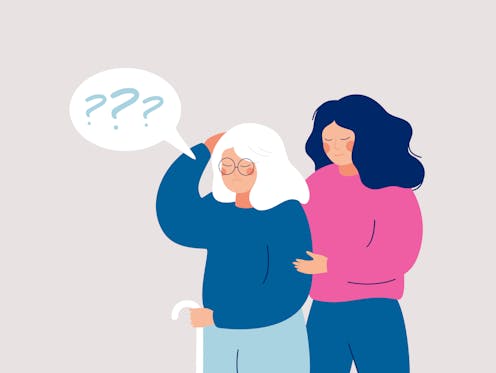How your status, where you live and your family background affect your risk of dementia
- Written by Yen Ying Lim, Associate Professor, Monash University

As part of a series on cycles of disadvantage[1], supported by a philanthropic grant from the Paul Ramsay Foundation, we’re publishing three articles on the social determinants of health. They look at how factors like income, where you live and your background affect your risk for cancer, dementia and heart disease.
By the year 2050, the World Health Organization[2] estimates one in five people will be aged 60 years and above. In Australia, our rapidly ageing population means that without a substantial medical breakthrough, the number of people living with dementia is expected to double[3] from 487,600 in 2022 to 1.1 million by 2058.
Significant effort has gone into understanding what increases the risk of dementia. Here, we consider research into three factors – your socioeconomic status, where you live, and your background – and how they may influence dementia risk.
How your socioeconomic status affects your dementia risk
When assessing socioeconomic status, researchers typically look at a combination of your income, years of education and occupation. Socioeconomic status refers to your ability to access resources such as health, information and services.
Socioeconomic status has been closely linked to a range of health disorders, and dementia is no exception. Studies[4] across multiple countries[5] have shown people with higher socioeconomic status are less likely to develop dementia.
This is unsurprising. People with high socioeconomic status are more likely to have the financial resources to access better healthcare, better education and better nutrition. They are also more likely to live in areas with more services that enable a healthy lifestyle.
Read more: Your pay, postcode and parents affect your heart disease risk[6]
Where you live
My research team[7] and others[8] have shown neighbourhood socioeconomic status – an index that integrates a neighbourhood’s average household income, unemployment rates, occupational skills and housing arrangements, among others, is associated with poorer memory and higher dementia risk.
Understanding this is complex. A wide range of economic, social and environmental factors can influence the way we behave, which can influence our health. Studies[9] suggest communities can support dementia risk reduction in three main ways.
The first is through encouraging social participation and inclusion. This can be achieved through programs that increase digital and technological literacy, social housing (which offers greater opportunity for socialisation) and neighbourhood assistance.
The second is through increasing proximity and access, particularly to health care, and social and cultural events.
The third is through improving recreational and well-being facilities, including emphasising traffic safety and increasing walkability and access to urban green spaces to encourage outdoor physical activity.
Your background
Several studies[10] suggest parental education is related to an individual’s dementia risk. Specifically, low maternal education is associated with poorer memory performance, and higher dementia risk. However, these effects are small[11], and adult education and socioeconomic status may overcome these disadvantages.
Current evidence[12] also suggests migrants from Africa and Asia (into Europe) have higher dementia risk compared with native Europeans. However, the prevalence of dementia in African and Asian countries is not higher than in European countries. Rather, we do see similarly elevated risk of dementia in culturally and linguistically diverse groups of people who are non-migrants[13].
Read more: Who you are and where you live affects your likelihood of getting, and surviving, cancer[14]
Part of this is due to the reduced access to high-quality education, healthcare, and health information in these groups. For migrants, there is the additional challenge of navigating health systems in their non-native language.
Another important part to consider is the potential bias[15] in the tools we have to assess memory and thinking abilities. These tests have been developed primarily in English, for use in European countries. Being tested in a second language may lead to poorer performance that is not a reflection of true cognitive ability, but rather a reflection of a reduced mastery of English.
This is why it is so important we conduct more research to understand dementia and its risk factors in culturally and linguistically diverse populations, using tools that are appropriate and validated for these groups.
Addressing dementia needs a life-long approach
Undoubtedly, your pay, postcode and parents are highly interrelated. Your future income is highly related to your parents’ level of income. Your postcode can be determined by your pay. The cyclical nature of wealth – or rather, inequality – is part of the reason why addressing health disparities is so challenging.
Studies on social mobility[16] – the ability of individuals to move from one socioeconomic class to another – have shown that upward mobility may only partially compensate for disadvantage earlier in life. This really brings home the message that addressing dementia risk requires a lifelong approach. And that intervention is needed at an individual and a broader societal level.
If you are interested in learning how to reduce your dementia risk by changing health behaviours, please join us at the BetterBrains Trial[17]. We are actively recruiting Australians aged 40-70 years old with a family history of dementia.
References
- ^ cycles of disadvantage (theconversation.com)
- ^ World Health Organization (www.who.int)
- ^ double (www.dementia.org.au)
- ^ Studies (pubmed.ncbi.nlm.nih.gov)
- ^ multiple countries (pubmed.ncbi.nlm.nih.gov)
- ^ Your pay, postcode and parents affect your heart disease risk (theconversation.com)
- ^ My research team (pubmed.ncbi.nlm.nih.gov)
- ^ others (pubmed.ncbi.nlm.nih.gov)
- ^ Studies (onlinelibrary.wiley.com)
- ^ Several studies (journals.sagepub.com)
- ^ are small (academic.oup.com)
- ^ Current evidence (www.cambridge.org)
- ^ non-migrants (www.sciencedirect.com)
- ^ Who you are and where you live affects your likelihood of getting, and surviving, cancer (theconversation.com)
- ^ potential bias (www.sciencedirect.com)
- ^ social mobility (academic.oup.com)
- ^ BetterBrains Trial (www.betterbrains.org.au)

















